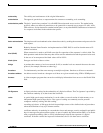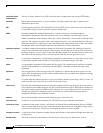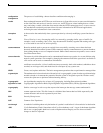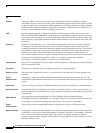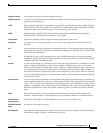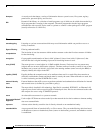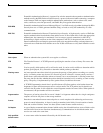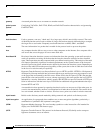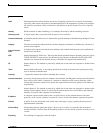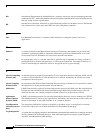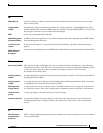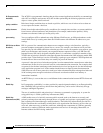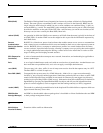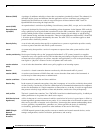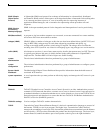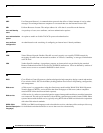
Glossary
GL-11
User Guide for Cisco Secure Access Control System 5.3
OL-24201-01
I
I18N
Internationalization and localization are means of adapting software for non-native environments,
especially other nations and cultures. Internationalization is the adaptation of products for potential
use virtually everywhere, while localization is the addition of special features for use in a specific
locale.
identity
Whom someone or what something is, for example, the name by which something is known.
identity groups
A logical entity that is associated with all types of users and hosts.
incremental backup
A scheduled job that allows users to take smaller, periodic backups of the Monitoring & Report Viewer
database.
integrity
The need to ensure that information has not been changed accidentally or deliberately, and that it is
accurate and complete.
internal identity
store
A database that contains the internal user attributes and credential information used to authenticate
internal users and hosts.
IETF
Internet Engineering Task Force . The body that defines standard Internet operating protocols such as
TCP/IP. The IETF is supervised by the Internet Society Internet Architecture Board (IAB). IETF
members are drawn from the Internet Society's individual and organization membership.
(IP
Internet Protocol. The method or protocol by which data is sent from one computer to another on the
Internet.
IPsec
Internet Protocol Security. A developing standard for security at the network or packet processing
layer of network communication.
Interrupt
A signal that informs the OS that something has occurred.
intrusion detection
A security management system for computers and networks. An IDS gathers and analyzes information
from various areas within a computer or a network to identify possible security breaches, which
include both intrusions (attacks from outside the organization) and misuse (attacks from within the
organization).
IP
Internet Protocol. The method or protocol by which data is sent from one computer to another on the
Internet. Each computer (known as a host) on the Internet has at least one IP address that uniquely
identifies it from all other computers on the Internet.
IP address
A computer's inter-network address that is assigned for use by the Internet Protocol and other
protocols. An IP version 4 address is written as a series of four 8-bit numbers separated by periods.
IP flood
A denial of service attack that sends a host more echo request ("ping") packets than the protocol
implementation can handle.
IP forwarding
An Operating System option that allows a host to act as a router. A system that has more than 1
network interface card must have IP forwarding turned on in order for the system to be able to act as
a router.
IP poofing
The technique of supplying a false IP address.



